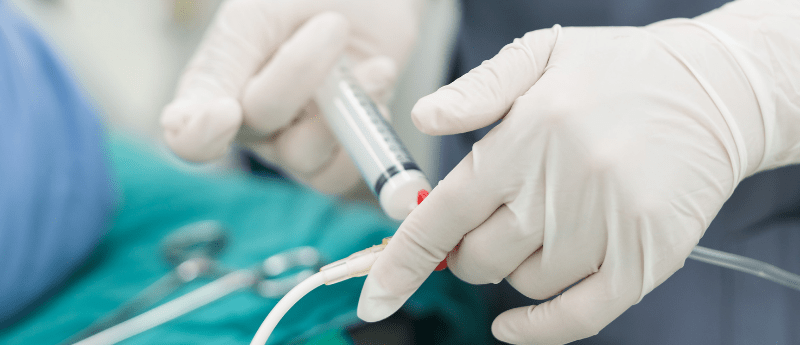


A team of researchers at the École Polytechnique fédérale de Lausanne (EPFL; Lausanne, Switzerland) have developed a continuous drug monitoring sensor that can measure anesthetic levels in patients during surgery.
The researchers, from EPFL’s Integrated Systems Laboratory working in association with the Lausanne University Hospital (Lausanne, Switzerland) and the Polytechnic University of Turin (Turin, Italy) reported their findings in IEEE Transactions on Biomedical Circuits and Systems.
The biosensor measures propofol concentrations in a patient’s blood. Using sensor electrodes, the novel ‘smart-pen’ electronic system offers a less costly and less bulky method of monitoring drug concentrations in human serum. Shaped like a syringe, the electronics for the sensors are housed in a central control box and measurements are analyzed using artificial intelligence.
During a typical surgery, anesthesiologists ensure that the patient does not wake up during the surgery and has no memory of the procedure using the smallest possible dose of drug. Successful surgeries rely on a very particular mixture of drugs and anesthetics. However, the actual drug concentration within a patient’s body is often unknown, which not only makes an anesthesiologist’s job harder but may have significant consequences during surgery.
By monitoring drug concentrations in human serum throughout surgery, doses can be adjusted accordingly in real-time, paving the way for personalized drug administration during surgery. Sandro Carrara, a professor at the EPFL, stated:
“Scientists have been working for years to develop sensors that can instantly measure blood concentrations of compounds in anesthetized patients so that doctors can personalize the doses…Propofol is one of the main compounds used in anesthesia, but it’s also one of the hardest to measure.”
Pharmacology professor and chief of the Lausanne University Hospital’s clinical pharmacology division, Thierry Buclin, added:
“Propofol is one of the best anesthetics out there but getting the dosage just right can be complicated. So, an easy-to-use system that can monitor propofol concentrations in the operating room would be a major step forward in surgery and intensive care.”
Having already confirmed the accuracy of their biosensor through machine learning, the team hopes to conduct in vivo tests in the future.
Sources: Aiassa S, Ros PM, Hanitra MIN et al. Smart portable pen for continuous monitoring of anaesthetics in human serum with machine learning. IEEE Trans. Biomed. Circuits Syst. 15(2), 294–302 (2021); www.eurekalert.org/pub_releases/2021-05/epfd-mos052821.php
The post Total knockout: towards personalized anesthesia appeared first on Bioanalysis Zone.
more recommended stories
 Phage Therapy Study Reveals RNA-Based Infection Control
Phage Therapy Study Reveals RNA-Based Infection ControlKey Takeaways (Quick Summary) Researchers uncovered.
 Safer Allogeneic Stem Cell Transplants with Treg Therapy
Safer Allogeneic Stem Cell Transplants with Treg TherapyA new preclinical study from the.
 AI in Emergency Medicine and Clinician Decision Accuracy
AI in Emergency Medicine and Clinician Decision AccuracyEmergency teams rely on rapid, accurate.
 Innovative AI Boosts Epilepsy Seizure Prediction by 44%
Innovative AI Boosts Epilepsy Seizure Prediction by 44%Transforming Seizure Prediction in Epilepsy Seizure.
 Hypnosis Boosts NIV Tolerance in Respiratory Failure
Hypnosis Boosts NIV Tolerance in Respiratory FailureA New Approach: Hypnosis Improves NIV.
 Bee-Sting Microneedle Patch for Painless Drug Delivery
Bee-Sting Microneedle Patch for Painless Drug DeliveryMicroneedle Patch: A Pain-Free Alternative for.
 AI Reshapes Anticoagulation in Atrial Fibrillation Care
AI Reshapes Anticoagulation in Atrial Fibrillation CareUnderstanding the Challenge of Atrial Fibrillation.
 Hemoglobin as Brain Antioxidant in Neurodegenerative Disease
Hemoglobin as Brain Antioxidant in Neurodegenerative DiseaseUncovering the Brain’s Own Defense Against.
 Global Data Resource for Progressive MS Research (Multiple Sclerosis)
Global Data Resource for Progressive MS Research (Multiple Sclerosis)The International Progressive MS Alliance has.
 AI Diabetes Risk Detection: Early T2D Prediction
AI Diabetes Risk Detection: Early T2D PredictionA new frontier in early diabetes.

Leave a Comment